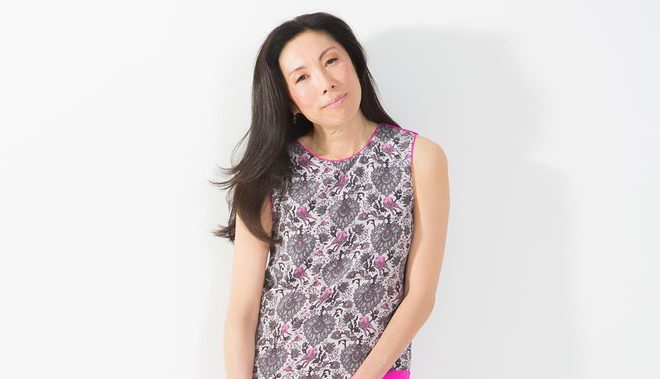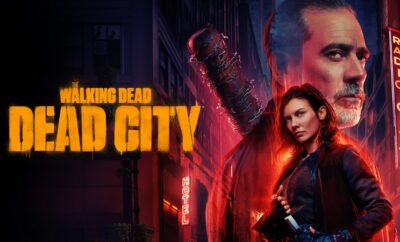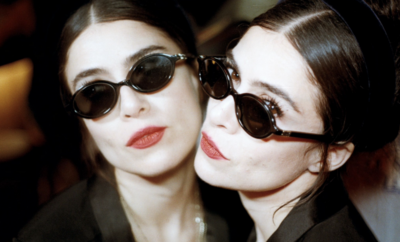 Peter Svenson
Peter Svenson
Interviews
Jodi Long – Falling Water
By: Lisa Steinberg
Q) “Falling Water” is quite a departure from your usual work in comedy.
A) I know! I was like, “Really? Okay. Let’s go for it!”
Q) Was this an audition for you?
A) It was. I spend a lot of my time in New York because that is where I’m from. I just happened to be in New York and they were shooting the series there, which is so fantastic. I just kind of went in and there it was. I usually don’t get to work in my hometown because of production, but it is changing a lot. So much of my work is usually outside of New York.
Q) How was the series pitched to you and your character?
A) I didn’t know very much about the show except that it was about dreams and that my character was obviously catatonic for seven years. So, she was an old hag in a sanitarium. Blake Masters (the showrunner, writer and EP) said, “With this show, we have this vision where you are dressed all in black and smoking a joint like with Andy Warhol in The Factory.” That’s what he said to me! I looked at him and said, “Well, that sounds like fun!” That wasn’t in the pilot. You just see me in this dress with the young Take (William Yun Lee) and playing with him. You don’t know what I’m quite doing with him in that scene. It will expand, but all I can say is that what is discovered is that I’m a sculptor during the Andy Warhol years. And then a welding sculptor! I actually had to learn how to weld, which was pretty interesting for me. Back in the 80’s my boyfriend was a metal welding sculptor. When I met him, he had just gotten a Rockefeller grant for sculpture. I lived in a loft with him in SoHo, New York while he was welding. The first thing I did was call him (after not talking to him for years) and asked, “What would you suggest? I have to learn how to weld.” He said, “Don’t touch anything because it is hot! And don’t drop the metal on your toe!” It was challenging for me because I had to light it and it kind of goes “boom!” You have to turn on the air and gas. So, I had to really learn how to do that and I would jump as it lit. I’d have to turn it down to get it hot, but it was very complicated. The guy who was instructing me would say, “Jodi, you can’t jump because then people will know you are not a pro at it.” [laughs] So, I finally got it down where it was really smooth. It’s amazing what you do for different parts. You learn different things.
Q) What was it like working with William Yun Lee?
A) I’m very blessed because I get to work with these incredible actors as my children. I just had such great relationships with them. The first thing I said to William was, “I’m just so happy we’re speaking English without an accent,” because normally I play a Korean mother with an accent. He comes from Martial Arts films and he turned to me and said, “I’m just so happy I’m not killing anybody the first seconds!” So, it’s a departure for both of us in what we are normally seen as.
Q) What sets this series that sets it apart from other shows involving Asian-American families?
A) I don’t think you’ve seen an Asian-American family like this on screen before. It will develop, but I don’t think you’ve ever seen this. It was really interesting to me. Maybe any family like this, but definitely not an Asian-American family.
Q) What do you think it is about the USA Network that has helped the series pushed boundaries?
A) I think it is two-fold. I think that the USA Network has really decided with “Mr. Robot” being such a hit. When we did the pilot for this, “Mr. Robot” had just started and it had gotten kind of critical acclaim. It was USA’s foray into a slightly edgier format. Before they were kind of known for drama with kind of a light touch. “Mr. Robot” took them away from that and I think that was on purpose for them. So, “Falling Water” came on the heels of that – at least the pilot did. It was great in that way. As soon as I saw “Mr. Robot” I thought it was fantastic. And then I found out that Rami Malek was Egyptian-American and I was like, “Even better!” So, with USA Network changing their programming now you also have this series written by Blake Masters and Henry Bromell who have Gale Ann Hurd as a producer. So, if you look at “The Walking Dead” it is very diverse and inclusive and has been going on for a long time. So, I think the mixture of all these elements coming together really kind of pushes the envelope a little bit. They want that and Gale takes it to a different level because people want to work with her since she is so successful with tapping into an audience. I think that the dream aspect of “Falling Water” and the collective unconsciousness of that – I think people are interested in that. We kind of tip the envelope into sci-fi and I think it is a good, interesting combination.
Q) This series has done great at expanding diversity in television.
A) I think with sci-fi it is pushing the envelope and now anybody can be anything. I’m all for inclusiveness and diversity. I’ve been working on this for a long time. I also do it with my union because I’m the head of the Equal Employment Opportunity Committee and I’ve been working on this for years. I’m just so happy that the time is now. It’s opening up. I have found in my working life as an actor (which has been over many decades) when there is a Democrat in office I work more. When there is a Republican there is a conservatism that comes in – not just in the material, but in the casting. You can look at my tax returns to really see it. I’m really serious! I think also what happens is that it doesn’t happen right away. When Obama came into office I was expecting it because we had our first African-American in office that it was going to open up. It actually took a few years before the openness, expansiveness and inclusiveness started to trickle down. If you look at the Regan and Bush years, I wasn’t really working as much. I was working in theater and other venues because television and film were much harder.
Q) Have you been made aware about the live action version of Mulan that is being discussed?
A) They just hired Alex Graves to be the director of it. And I just saw the Asian community is not that happy about that. Look, I think having the conversation is a good thing. I tell this to all the groups that I work with (and I work with a lot) that you have to talk about this and say, “This isn’t right.” Whether they do anything about it or not, you have to make your voice known otherwise there won’t be change because historically Asian Americans are pretty quiet about it. They weren’t vocal about it and you have to be vocal. I think the African Americans have done the best job of the underserviced or minority communities – although I don’t think they are minorities anymore in this country. But I think you have to say what it is and that this is not right and then let the cards fall where they may. But you have to make protests. It doesn’t have to be violent. It should be peaceful and well thought out, but you have to do it otherwise they don’t know there is anything wrong with it. We can’t have our stories be told by people don’t know what the stories really are.
Q) What else can we tease is in store this season on “Falling Water?”
A) I feel like I can’t really share it. I don’t want to tell you too much. You’ll see me more later on in the series. I’m not just catatonic, which I did discover when I researched it is a bipolar state. You are either depressed or really high. And that’s what they actually consider catatonic to be – that you are in the manic phase of your bipolar. Even though you are not talking, your eyes are open and you are not functioning – it is that manic state. That’s what you’ll see as things unfold.




You must be logged in to post a comment Login